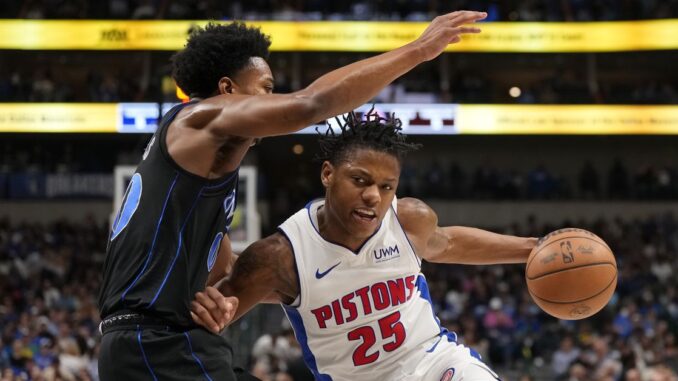
Pistons’ $10M Cap Space: Will It Slip Away Without a Game-Changing Move? The Detroit Pistons, led by their new president Trajan Langdon, made it clear that their focus this offseason was on strengthening the roster across various positions. Although they’re not aiming for a playoff spot this season, they grew tired of enduring 60-loss seasons and brought in skilled veterans in multiple areas.
However, one position they didn’t address was point guard. The team is currently the only franchise with cap space left to use, and there are still plenty of free agents available. They also have several young players in need of development time, and they’re keeping an eye on potential in-season trade opportunities.
Despite their emphasis on adding competition, shooting, and experienced veterans to the roster, the glaring gap at backup point guard is the most concerning aspect of their offseason moves.
Reinforcements Everywhere but PG
In the draft, the Pistons added an intriguing potential two-way wing in Ron Holland and, to a lesser extent, Bob Klintman. They filled a significant gap at starting power forward by bringing in Tobias Harris and bolstered their guard and forward positions with high-volume shooting veterans Malik Beasley and Tim Hardaway Jr. They even strengthened their bench by signing Paul Reed, one of the better reserve centers in the league.
However, despite parting ways with incumbent point guards Killian Hayes, Monte Morris, and Malachi Flynn, they didn’t add a player with significant experience at the position this offseason.
Instead, they appear willing to gamble by entrusting ball-handling and playmaking duties in bench lineups to three players who aren’t true point guards. Jaden Ivey, who was forced into the role during his rookie season after Cade Cunningham’s injury, still has room to grow in terms of decision-making and vision. Marcus Sasser, an explosive bench scorer, struggled during his rookie season to see beyond the first read and is better suited as a shooting guard rather than running the offense. Then there’s Ausar Thompson, who can play across the lineup but has a shaky handle and wasn’t asked to orchestrate much with the ball. Yet, there’s potential that Thompson might be maximized in a point-forward role, despite his limitations as a shooter.
It might seem unnecessary to worry about the backup point guard spot given that Cunningham is likely to log over 34 minutes per game as the starter. But, as of Sept. 1, I can’t deny that the lack of depth at backup point guard is a major concern.
$10 Million But Nobody to Spend it On
The Pistons certainly have the financial resources to make a move. With $10.2 million and an open roster spot this offseason, they have room to maneuver. Although there are point guards available, they don’t seem to meet the criteria Langdon was focusing on earlier.
Langdon’s main criteria appeared to be whether a player can consistently make three-pointers at a high volume and play more than 70 games per season.
Tobias Harris, Malik Beasley, and Tim Hardaway Jr. all meet these requirements, but the available point guards do not.
Markelle Fultz is the top unrestricted free agent, but his performance has been inconsistent. Despite overcoming early career struggles and excelling as a bench player with the Orlando Magic, his shooting within three feet dropped from 68% to 62% last season, and he played only 43 games. Additionally, he lacks an outside shot. His ball-handling responsibilities also diminished as Jalen Suggs emerged, leading to a drop in his assist numbers. While he is a better defender and floor general than the current versions of Ivey and Sasser, he may not fit Langdon’s ideal.
Beyond Fultz, the options are less promising. Dennis Smith Jr., a former Piston who is now 26, showed improvement last season with the Nets but doesn’t offer much in terms of floor spacing. Veteran players like Patty Mills and Ish Smith are not viable options for similar reasons.
Letting Young Players Develop
Detroit’s lack of urgency in addressing the point guard position became evident when Tyus Jones remained on the free agent market for most of the summer. Jones, coming off the best shooting season of his career with the Washington Wizards and boasting an impressive 7:1 assist-to-turnover ratio, was surprisingly unsigned at his asking price. It seemed like a prime opportunity for a team like the Pistons to offer him a one-year deal with the promise of a trade to a contender before the deadline. Instead, Jones ended up signing a $3.3 million contract with the Phoenix Suns.
This could suggest either the Pistons have strong faith in the potential development of Ivey or Sasser as bench players, or they simply had no other options to consistently utilize them and didn’t want to trade one for a low return.
Another possibility is that the Pistons are strategically holding onto their $10 million in salary cap space and roster spot, hoping it could be useful for a mid-season trade if a team needs a third party. While the chances are slim, the potential benefits could outweigh the value of any free agent signing.
As it stands, it looks like the Pistons might rely on off-guards to handle the offense off the bench. And if Killian Hayes doesn’t make the final roster with Brooklyn, maybe Detroit could consider bringing him back.
Leave a Reply